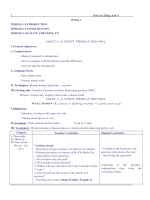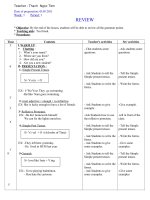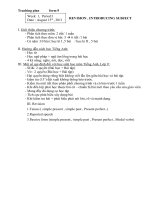Giáo án tiếng Anh lớp 9 bài 6
Bạn đang xem bản rút gọn của tài liệu. Xem và tải ngay bản đầy đủ của tài liệu tại đây (370.77 KB, 13 trang )
Week 19
Period 37
UNIT 6 :
LESSON ONE :
AIM : Reading about the work of a group of convervationists , and using the structure of the
conditional sentence (type 1)
OBJECTIVE : By the end of the lesson , students will be able to know more about the environment
problems and use the conditional sentences type 1 accurately .
SKILLS : Listening – Speaking – Reading .
TEACHING AIDS : Pictures , posters , cues .
PROCEDURE:
T CONTENT TEACHER’S ACTIVITIES
STUDENTS’
ACTIVITIES
5’
20’
I . WARM UP
Brainstorming
Air pollution
Environmental problems
II . PResentation
1. Preteach vocabulary
1 . a dump: bãi đổ, nơi chứa
2 . deforestation(unc.n): sự tàn phá
rừng, hiện tượng rừng bò tàn phá
3 . dynamite(unc.n):thuốc nổ
4 . pesticide(unc.n): thuốc diệt trừ
sâu bọ
5 .disapointed(adj): thất vọng
2.Checking memory
3.Set the scene
(Part a , Page 48 )
- Setting up the activities
- Asking Ss to tell the words or
phrases about environmemtal
problems
- Giving examples
-Beginning the activities
- Eliciting modelling
Checking : meaning ,
pronunciation
- Where’s this? There are a lot
of garbage here.
Where’s this? You can see the
trees, they are cut
down.What’s the problem?
What does it mean in Vietnamese?
What does it mean in
Vietnamese?
You all get bad marks in
English test. I am very
disapointed with you.
- Matching
- Setting up the scene
- Making sistuations to
introduce a new lesson by
drawing pictures
- Taking part in the
activities in groups
- Listening and
repeating in chorus
individually
It’s a dump
Deforestation
It means thuốc nổ
It means thuốc diệt trừ
sâu bọ
It means thất vọng
- Copying
10’
8’
2’
4.Listen and check
1f , 2e , 3b , 4a , 5c, 6d
5.Listen and reapeat
6.Read and answer
-What will they achieve if they work
hard today ?
If they work hard today , they will
make the beach clean
7. Focus on grammars
If – clause Main clause
V
1
Will/can…+ V
0
III . practice
1.Drills
- I / buy / car / if / have / money
- She / stay / home /if / it / rain
- If / We / plant trees / there / fresh
air .
- If / he / come / he / meet /you
2.Work group
IV .production : Discussion:
Ex : We should clean the yard .
We should …..
V . HOMEWORK
Part b , Page 48
*Who are they ?
*what are they doing ?
“Mr Brown is talking to some volunteer
conservationists . They are going to
clean the beach”
- Asking Ss to read the Part a ,
Page 48 , Guess so as to match
A to B
- Giving examples
- Monitoring and assisting
- Asking Ss to write their
guessing on the board
- Asking Ss to listen to the tape
and check what they guess
- Asking Ss to listen and repeat
- Asking Ss to read text again
and answer the question
- Monitoring and assisting
- Correcting and evaluating
- Presenting the new target
language by checking the
concepts :
*what does it mean ?
*what is the form ?
*what do we use it for ?
*and intonation ?
- Asking Ss to make sentences
using the words on the cues
- Running through the cues
- Modelling
- Monitoring and assisting
- Correcting and evaluating
- Asking Ss to discuss what
you are going to do to keep
your school clean
- Giving examples
- Monitoring and assisting ss-
Correcting and feeding back
- Listening and taking
part in building the new
lesson
*Mr Brown and
volunteers
- Guessing so as to
match individually
comparing
- Listening and
checking
- Listening and
repeating in chorus
- Reading and
answering
- Listening and
answering
- Listening and
repeating in chorus
individually
- Writing in groups
- Discussing in groups
Listening to the
information and
copying the task.
Week 19
Period 38
LESSON TWO :
AIM : Practice speaking to persuade their partner to protect the environment .
OBJECTIVE : By the end of the lesson , students will be able to use the expressions to persuade
someone to do something fluently .
SKILLS : Speaking – Listening .
TEACHING AIDS : Pictures , posters .
PROCEDURE:
T CONTENT TEACHER’S ACTIVITIES
STUDENTS’
ACTIVITIES
5’
15’
I . WARM UP
Slap the board
Reduce recycle reuse
Save keep turn off
II . PRE speaking
1.Preteach vocabulary
1 . (to) prevent= stop something
2 . (to) wrap: gói
3 . (to) dissolve: phân huỷ, làm tan rã
4 . (to) avoid: tránh
2.Checking memory
3.Set the scene
Dialogue build
Lan : How do you go to school ?
Nam : By motorbike .
Lan : I think you should go to school
by bike .
Nam : Why ?
Lan : Because we can keep the air
cleaner .
- Setting up the activities
- Asking Ss to Ss to go to the
board to slap on the correct
words
- Giving examples
- Monitoring and assisting
- Eliciting modelling
Checking : meaning ,
pronunciation
What’s the synonym of “ stop
sth”?.
What’s this? What am I doing?
What does it mean in
Vietnamese?
What does it mean in
Vietnamese?
- What and where
- Setting up the scene
- Making sistuations to
introduce a new lesson by
drawing pictures and asking Ss
some questions
Lan - Nam
- Taking part in the
activities in groups (A-
B)
- Listening and
repeating in chorus
individually
It’s “ to prevent”
You are wrapping it.
It means “ phân huỷ”
It means “ tránh”
- Copying
- Listening and taking
part in building the new
lesson
15’
8’
2’
4. Focus on expressions
-I think you should …..
-Won’t you ……….?
-It would be better if you …..
-Why don’t you ……… ?
-Why not ……….?
What / How about …………?
III . while speaking
1.Exercise b Page 49
Ex :
• How can we save paper ?
A : I think we should use banana
leaves to wrap food .
B : Why ?
A : Because we can save trees or
paper .
B : That is a good idea .
(Do the same for the others)
2.Pair work
IV . Post speaking
Discussion
Ex : We should do something to
protect the air and the water . We
should :go to school by bike
V . HOMEWORK
Write it up
Ex : We should do something to
*Who are they ?
*What are they talking about ?
“Lan and Nam are chatting
each other about how they go
to school every day in order to
save energy”
- Eliciting from Ss to make a
dialogue
- Modelling
- Monitoring and assisting
-Correcting and evaluating
- Presenting the expressions
by eliciting from Ss
- Asking Ss to copy
- Asking Ss to choose the
questionaire to answer it (Ss
may use the the ideas in
section a)
- Putting the posters of section
a abd b on the board
- Eliciting the posters
- Giving examples
- Asking Ss to do the same for
the other questionaire
- Monitoring and assisting
- Correcting and evaluating
- Asking Ss to practise
speaking in groups to discuss
about what they should do to
protect the air and the watter
- Giving examples
- Monitoring and assisting
- Correcting and evaluating
- Asking Ss to write about
what they should do to protect
the air/watter .
*Lan and Nam
*How to save the energy
- Listening and building
the lesson
- Practising speaking in
pairs
- Listening and
answering
- Copying
- Answering
individually
- Practising speaking in
pairs
- Discussing in groups
- Listening to the
information.
protect the air and the water . ……. - Giving examples
- Checking comprehension
- Copying the task
Week 20
Period 39
LESSON THREE :
AIM : Practising listening for details to complete the notes about the reasons why our oceans are
polluted .
OBJECTIVE : By the end of the lesson , students will be able to know why the oceans are polluted
SKILLS : Listening – speaking .
TEACHING AIDS : Pictures , posters .
PROCEDURE:
T CONTENT TEACHER’S ACTIVITIES
STUDENTS’
ACTIVITIES
5’
15’
I . WARM UP
Slap the board
Sự ô nhiểm dầu
Rác đại dương nhà máy
Đất tàu
II . PRE listening
1.Preteach vocabulary
1 . (to) pump: bơm
2 . waste material(unc.n): đồ phế thải
3 . sewage(unc.n): nước thải,nước
cống
4 . (to) spill: làm đổ
2. Checking memory
3. Set the scene
Open prediction
Reasons :
- garbage
- waste paper
- ……..
- Setting up the activities
- Asking Ss to Ss to go to the
board to slap on the correct
words
- Giving examples
- Monitoring and assisting
- Eliciting modelling
checking meaning ,
pronunciation
What am I doing?
What does it mean in
Vietnames?
What are they?
What did he do the books?
- Rub out and remember
- Setting up the scene
- Making sistuations to
introduce a new lesson by
using pictures of getting
started and asking Ss some
- Taking part in the
activities in groups (A-
B)
- Listening and
repeating in chorus
individually
You are pumping
It means “ đồ phế thải”
They are “ sewage”
He spilled them
- Copying
- Listening and
answering to take part
in building the new
lesson









